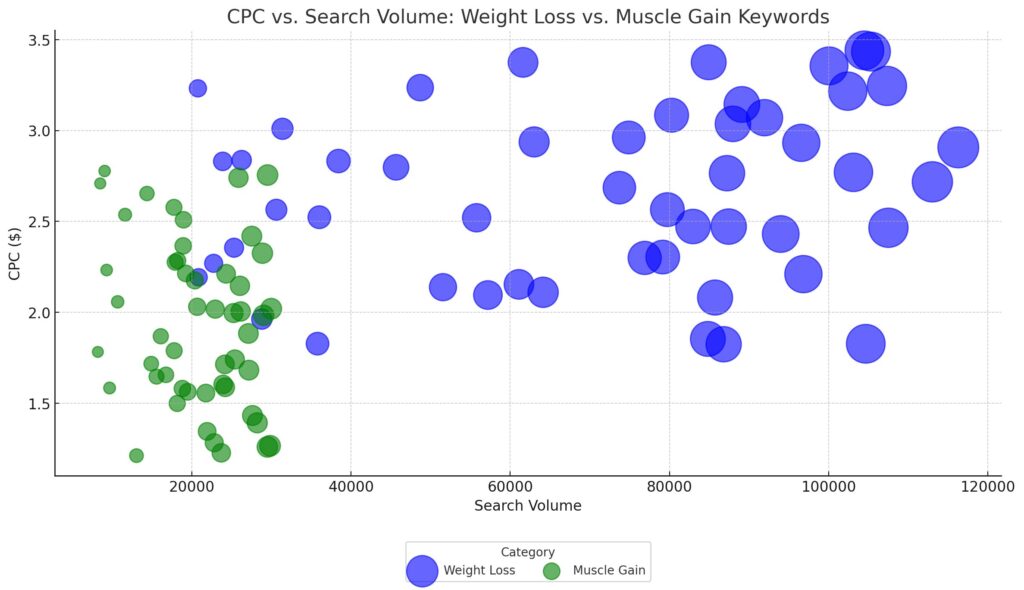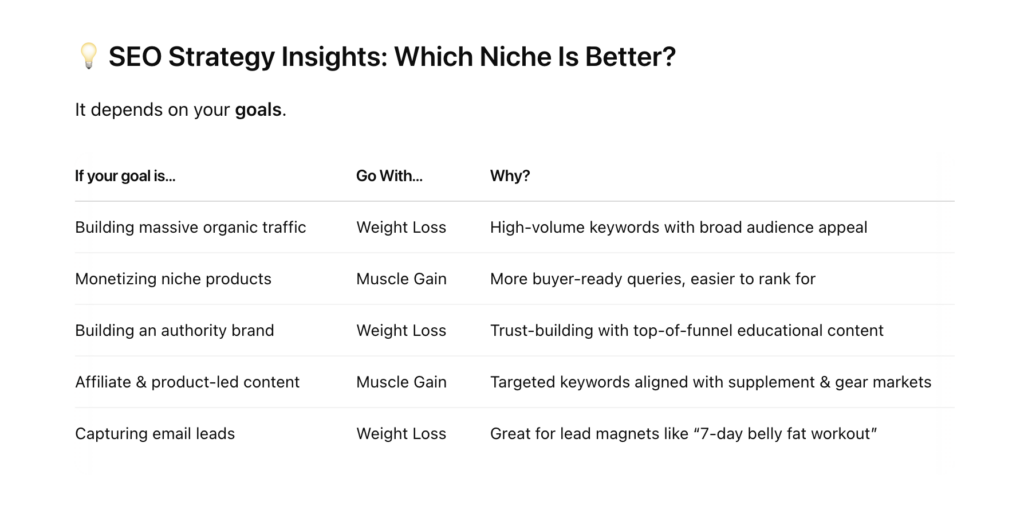If you’re in the health or fitness space, you already know that not all niches perform equally when it comes to organic traffic. But what if you could pick your content or product focus based on hard data i.e., search trends, CPCs, and keyword behavior?
We’re diving deep into two powerhouse niches Weight Loss and Muscle Gain to find out which offers better ROI in terms of SEO potential in 2025.
We analyzed 200 keywords (100 per niche) based on:
- Search volume
- CPC (Cost Per Click)
- Intent
- Keyword competition level
Here’s what we learned and what it means for content creators and health brands,

- Weight Loss wins in total traffic volume and ad competition
- Muscle Gain is lower in volume but more product-intent rich and transactional
- Both niches have commercial potential, but they attract very different users

Weight Loss: Massive Demand, Broad Appeal
The weight loss niche continues to dominate in search. Across 100 keywords focused on belly fat and general fat loss, the average monthly search volume is 68,550 per keyword, with a total of over 6.8 million monthly searches.
Most of these keywords have informational intent:
- “how to lose belly fat”
- “exercise to lose belly fat fast”
- “how can I lose the fat from my stomach”
These are discovery-stage queries, meaning users are early in their journey. They’re might be searching for:
- Tips
- Routines
- Home remedies
- Diets
What Makes This Niche Valuable?
- CPCs are high, averaging $2.55, indicating strong advertiser demand
- Huge potential for blog traffic, YouTube content, or affiliate fitness programs
- High volume = more testing room for content angles and lead generation
But…
What Are the Drawbacks?
- It’s ultra-competitive. Everyone from personal trainers to big fitness platforms is targeting this space.
- Keywords tend to cluster around similar phrases (e.g., variations of “lose belly fat”), so originality and authority matter.
Muscle Gain: Lower Volume, Higher Commercial Intent
Now let’s talk about muscle gain.
While the total volume is smaller only 1.85 million searches across 100 keywords. The nature of those keywords is more transactional. Examples include:
- “best protein powder for muscle gain”
- “muscle gain supplements”
- “how to gain muscle mass fast”
These users are often high purchase intent. They’ve moved past curiosity and are looking for:
- Specific products
- Diet routines
- Workout plans
In other words, purchase-ready traffic.
What Makes Muscle Gain a Smart SEO Bet?
- CPCs are lower than weight loss (avg. $1.98), but the commercial intent is higher
- Easier to monetize through:
- Affiliate product links
- Fitness coaching
- Supplement or gear recommendations
- Less saturated than the weight loss niche, especially in long-tail queries

Keyword Clustering Opportunities
Weight Loss Clusters:
- “How to lose belly fat”
- “Exercises to burn stomach fat”
- “Best diets for fat loss”
- “Lose weight fast at home”
These keywords are perfect for:
- Blog series
- YouTube playlists
- Lead generation PDFs
Muscle Gain Clusters:
- “Best protein powders for muscle gain”
- “How to build muscle and lose fat”
- “Supplements to gain mass fast”
- “High-protein diets”
These keywords are ideal for:
- Product comparisons
- Sponsored review content
- Affiliate pages with strong CTAs
Who Wins?
From a pure SEO ROI perspective, both niches are valuable but in different ways.
- Weight Loss is the better play for long-term traffic, content funnels, and brand awareness.
- Muscle Gain is a sharper pick for ecommerce, affiliate marketing, and product-focused strategies.
If you’re a:
- Fitness coach? Start with weight loss for traffic, layer in muscle gain for monetization.
- Supplement brand? Muscle gain is your playground.
- Health blogger? Build authority in weight loss, then niche down into specific fitness goals.


